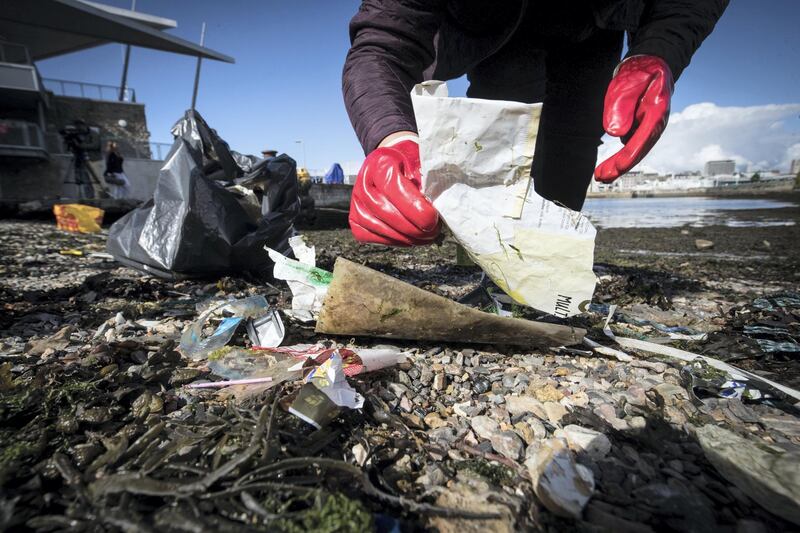The scourge of plastic in the world's oceans has moved further into the spotlight of late and firmly settled in the public consciousness with governments and businesses also starting to take action.
As well as increasing coverage in the press, the impact of the second series of the BBC's Blue Planet has been pivotal in communicating the extent of the problem to the masses.
Public figures have added their voices and time to the cause, such as Sheikh Hamdan bin Mohammed, Crown Prince of Dubai, who spent a day last year collecting rubbish from the seabed in the emirate.
This move to become more environmentally friendly has not happened overnight, with young people tending to lead the way.
A 2015 Nielsen study showed that almost 72 per cent of millennials are willing to pay extra for sustainable products. They are not completely at odds with other generations: 51 per cent of those aged between 50 and 64 years old were also willing to pay extra, an increase of 7 per cent on the previous year.
Businesses are reacting. Many are introducing initiatives to encourage consumers to cut down on single-use plastics.
In the UK alone, an estimated 2.5 billion takeaway coffee cups are discarded every year. Several coffee chains, including Costa and Starbucks, now offer discounts for customers who bring in their own cup. Pret a Manger this year doubled its discount to 50p (Dh3).
The chain has also launched reusable water bottles, installed water stations in some shops and its vegetarian-only shops offer biodegradable cutlery.
Many restaurants in Britain have joined the Refuse the Straw movement by giving them only to customers who request one. Similar incentives around coffee cups and straws are in place in countries across the world.
Governments are starting to address the issue. Several countries have implemented a nominal charge for plastic bags in shops and some have banned them outright. The UK experienced an 85 per cent reduction in the number of plastic bags used when a 5p charge was introduced in October 2015.
_______________
Read more:
Exclusive: Gulf states consider zero landfill target for plastics by 2040
Five tips on how to live a plastic-free life in the UAE
UAE scientists concerned about 'catastrophic' plastic use across the globe
_______________
This week, the secretary general of Gulf Petrochemicals and Chemicals Association said Gulf states are working towards a zero landfill target for reducing plastic waste by 2040.
The dumping of plastics remains a sensitive issue in the Middle East, with the capacity to cause social unrest, as in the case of Lebanon, where a mountain of unrecycled plastic washed ashore this year to exacerbate a festering crisis over uncollected rubbish.
In the GCC, companies such as Bee’ah in Sharjah have begun recycling plastic, including car tyres, which are transformed into jogger tracks and rubber tiles.
Last October, Saudi Arabia’s Public Investment Fund, the kingdom’s sovereign wealth fund, also launched a recycling company, with the aim of reprocessing 85 per cent of the country’s recyclable waste, which is currently dumped in landfills.
The kingdom is estimated to generate about 50 million tonnes of plastic waste a year.
One country worth emulating is Norway, which recycles 98 per cent of its plastic bottles. Only two types of plastic are allowed in production there, and tightly prescribed manufacturing rules apply to the labels of bottles and glue in a bid to make recycling more profitable. Shoppers pay a nominal extra cost when buying a drink in a plastic bottle, which is then refunded when the bottle is returned to the shop to be recycled. Broadly, customers seem content with the system and it is producing significant results.
This year the EU has effectively declared war on plastic pollution, and it has single-use plastics squarely in its crosshairs.
"Plastics: we can't live without them but we can be killed by them," joked Frans Timmermans, the European Commission's First Vice-President during a press conference in Brussels this year.
The potential effect of the commission committing to tackling plastic waste is enormous.
Europe generates 26 million tonnes of plastic waste every year, of which 60 per cent is packaging. In 2014, less than a third of Europe’s plastic waste was collected for recycling.
A report from the Ellen MacArther Foundation shows that globally, 14 per cent of packaging is recyclable. Of that, a third never gets recycled but ends up in landfill. The same report found 95 per cent of plastic packaging material value is lost to the economy after a short first use. This costs Europe between €70 billion (Dh319.1bn) and €105bn a year. These single-use plastics account for 50 per cent of litter on EU beaches.
In an attempt to tackle this while making Europe’s economy more sustainable, the EU launched a Circular Economy Action Plan. Part of this is the ambition to change how plastics are designed, produced, used and recycled; by 2030, the plan is for all plastics packaging in the EU to be recyclable.





